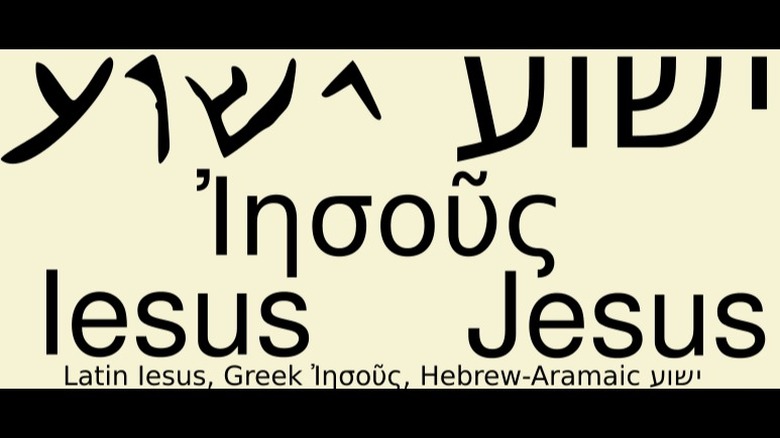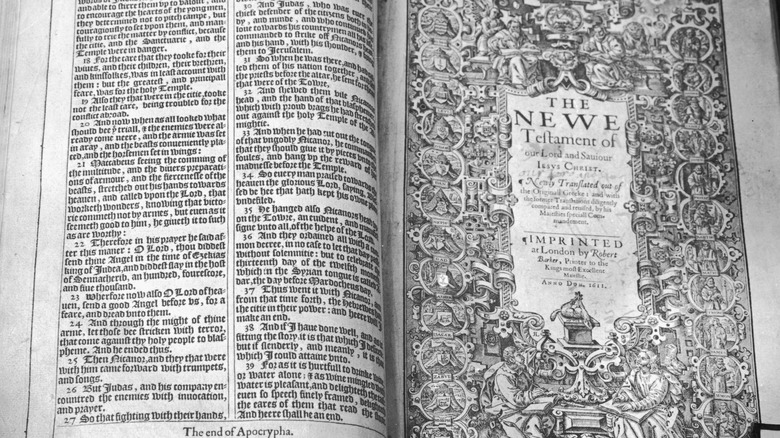
What Was Jesus’ Real Name?
One of the most important figures in human history is Jesus Christ or, if you prefer, Jesus of Nazareth. The religious figure, who serves as the focal point for the 2.3 billion followers of the religion that bears his name (per Pew Research Center), has been celebrated in art, music, literature, and other forms in the 2,000 years since he lived and died.
However, for most of those 2,000 years, just about everybody who has said his name has pronounced it wrong. This is because Jesus did not speak modern English, nor did he speak modern Spanish, Japanese, or indeed, any language spoken by all but a handful of people today. He likely used ancient Aramaic (a cousin of Hebrew, according to History) in his everyday life, and his name was an ancient Aramaic name. What’s more, the name we call him was not transliterated directly from the ancient language into whatever modern language the speaker is using; rather, there was an intermediary language that muddled the picture even further.
When you are saying Jesus’ name in modern English, what you are saying is actually the English transliteration of the ancient Greek transliteration of an Aramaic name, according to Newsweek, since the New Testament was written in that language. Therefore, it looks and sounds different from what his mother named him. Similarly, when you say “Jesús” in Spanish, or “Ieyasu” in Japanese, or however his name is rendered into any modern vernacular, you are saying the local version of the ancient Greek version of the Aramaic name.
Jesus' real name was something akin to Yeshua
The first century prophet likely went by the name “Yeshua,” which was short for “Yehōshu’a.” According to Learn Religions, it means something akin to “God is salvation.” And if it looks somewhat familiar, that is because another Bible character had the same name: the Old Testament’s Joshua. However, the New Testament was written in ancient Greek, which rendered Jesus’ name as “Iēsous,” which wound up in English as “Jesus.”
PBS’ “Origin of Everything” reported that while a more direct translation of Yeshua in English would be Joshua, it was the efforts of the writers of the New Testament to make the Hebrew and Aramaic name work in Greek that lead to the evolution of the name. As PBS reported, “that’s because the original authors of the New Testament were trying to convert the sound of the Hebrew name into Greek letters, but since they didn’t have the letters or spelling to represent the ‘sh’ sound in their language, they substituted an ‘S’ sound in the middle and that led them to Iēsous.”
Later, the 16th century translations of the Bible changed the “I” at the beginning of the name and replaced it with a “J,” per PBS, and eventually his name was spelled “Jesus.” However, there is no explanation exactly why the replacements happened, other than to say it had largely to do with transliteration, or changing sounds and letters from one alphabet to a separate alphabet — like a square peg in a round hole.
Jesus didn't have a last name
The name “Jesus” today is synonymous with the Christian belief that a man by that name was the son of God. Jesus is a well-known name that requires no introduction to most people living in the world thousands of years after the historical figure died, regardless of their religious beliefs or lack thereof, but in Yeshua’s era, his name was pretty common, according to Slate.
Per Slate, back in Jesus’ day, people with the same name were distinguished by who their father was. So, young Yeshua’s surname would not be a family name like the way we pass down such names today. Rather, he would have been known as “the son of” Joseph, or “Yeshua Bar Yehosef.” Another way they would have distinguished one Yeshua from another is by tacking the place they were from on to the end of their names, i.e. Yeshua Nasraya, which in modern English translates to Jesus of Nazareth. The word “Christ” was never part of Yeshua’s name. It means “anointed one,” per World History Encyclopedia, and it’s a title.
Amidst the backdrop of all of this is the discussion of whether calling Jesus something that sounds only vaguely like his actual name is disrespectful or even sinful. Some Christians vehemently believe that he should be referred to by his original name, according to Learn Religions. However, Christendom has largely rejected that view, arguing that one’s salvation is in no way tied to how Jesus’ name is pronounced.

Here's Why The US Military Once Burned Bibles

The Truth About A Feral Child Who Was Kept As A Royal Pet

The Messed Up Truth Of Venezuelan President Nicolas Maduro

The Truth Behind The Brazilian Island Where Giving Birth Is Forbidden

The Untold Truth Of The French Resistance

Tony Alexander King: Where Is Rocio Wanninkhof's Killer Today?

The History Behind The Callanish Stones

The Truth About Frank Sheeran And Jimmy Hoffa's Relationship

The Surprising Origin Of Acrylic Nails

The Tragic Death Of Jeff Buckley
























